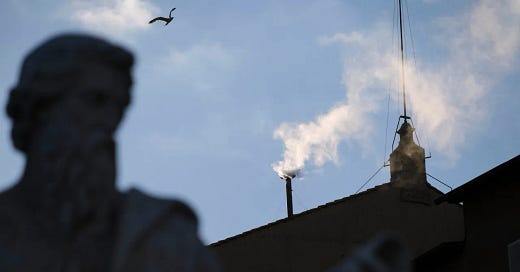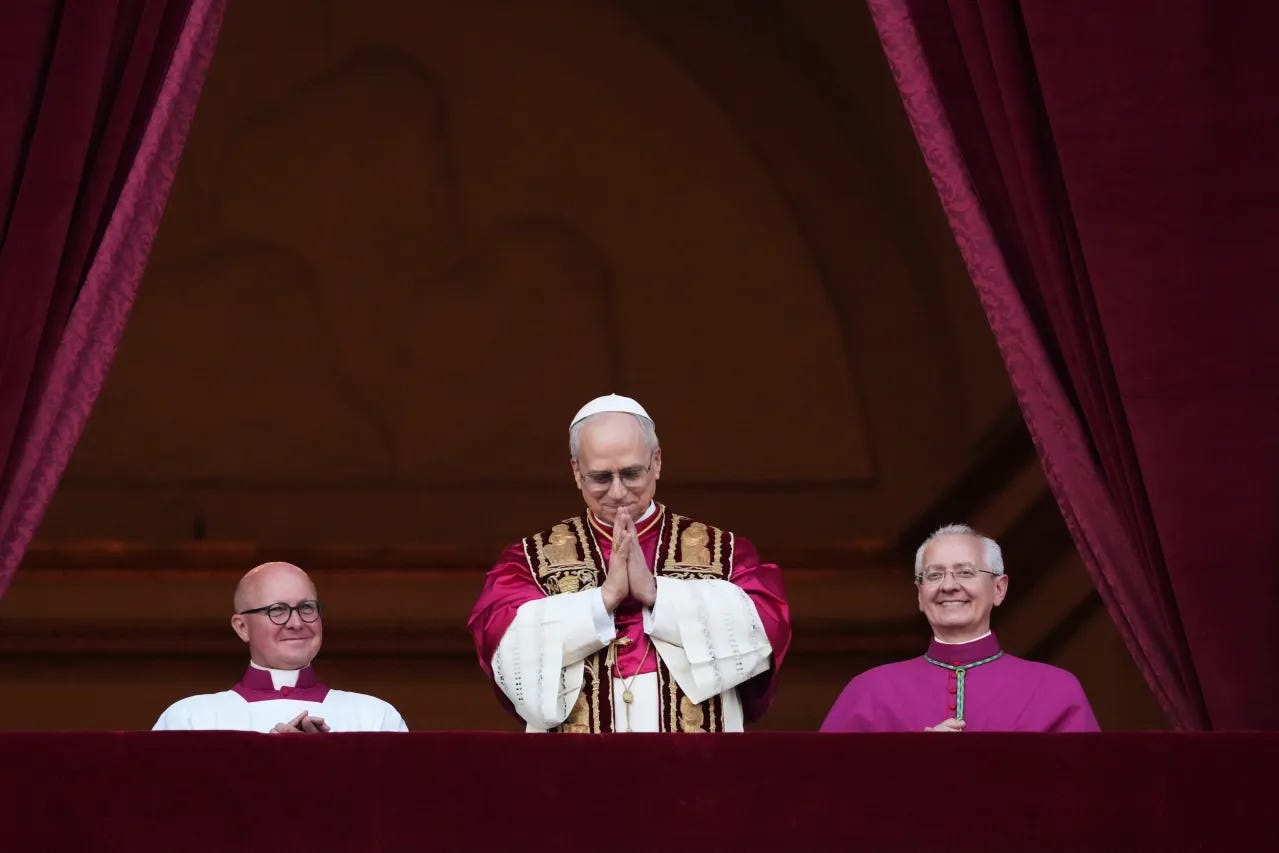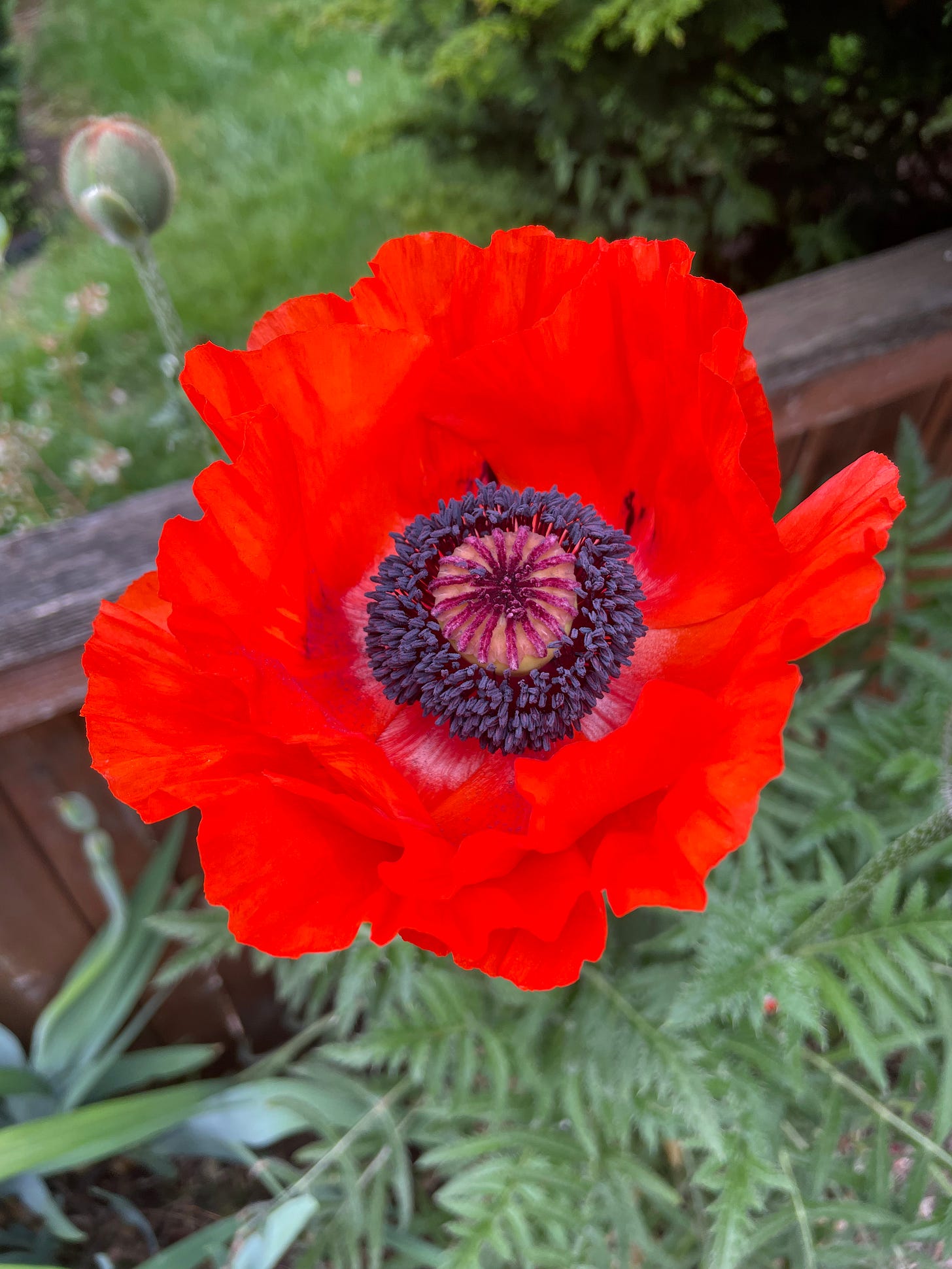I heard the whole address before I knew who was delivering it. Yesterday morning I saw the white smoke on the news as I was heading out the door to the library, but I knew it would be at least an hour before the new pope appeared, and, well, I needed some books for a research project. (I must admit that this is very on brand for me. Nothing gets in the way of my attachment to the library.)
When I got in the car to head home, I turned on the radio, and of all the unlikely serendipities in the world, I was treated to this one: the new pope was just beginning his first address, live, with off-the-cuff translation from a reporter. I had no idea who he was, but tears filled my eyes as I heard words like “humble” and “dialogue” and “open arms.” I heard him praise Pope Francis and honor his memory, and I heard the word “peace,” over and over and over again. I arrived home just as he was finishing the Hail Mary.
I still had no idea who he was. But I was flooded with an unfamiliar feeling: hope.
I have a confession to make: I hadn’t necessarily been feeling all that hopeful about the conclave. I was following the news, of course, especially with so many friends working in Catholic media (and I hope they all are getting a good nap today!)
As I took a magnifying glass to my feelings, I realized that they could be partially explained by the fact that hope is in rather short supply these days. We live under the thumb of a gleefully cruel administration, amidst horrific wars, rising authoritarianism, and human rights violations as far as the eye can see. It’s not exactly the golden age of humanity.
But I think the other half of my wary approach was rooted in my love for Francis and my deep respect for his radical humility and humanity, his refusal to let the trappings of power and prestige get in the way of his most urgent desire: to be close to people, especially to the poor, to the suffering, to all people left behind and forgotten. I realized yesterday that I think some things about Francis are just unrepeatable, and that’s something that it’s okay to grieve.
It’s personal, for us: we named our son after Francis. I’ve had a draft open in Substack for weeks, trying to put into the right words what he meant to me. Here’s my best shot at it.
The last photo I have before the birth of my son is a picture of my giant belly with Pope Francis’ book The Name of God is Mercy propped up on it.
I think maybe I knew he was something different when he declined to wear the fancy red shoes. When he refused to live in the fancy papal apartment. When he turned down a fancy car. When he resisted being waited upon by maids and servants, insisting on making his own bed and taking his own dishes to the kitchen.
Maybe I knew when he chose the name Francis after St. Francis of Assisi, when he said it was to help him remember the poor. When he echoed his namesake, saying how much he would love for us to be a poor Church for the poor.
Maybe I knew when he wrote Laudato Si’ and insisted not only that we care for the earth as our sacred shared home, but also that we care for the people most hurt by the destruction of the earth: the poor.
Maybe I knew when he said, “Who am I to judge?”
Maybe I knew when he instituted the synod, when he called us to be a church of accompaniment, defined by a culture of encounter.
When Pope Francis was elected in the spring of 2013, I was still finding my place in the Church I had returned to after almost a decade away in evangelicalism. I defy you to find a more bright-eyed and bushy-tailed spiritual seeker than I was at age sixteen in 1998, eager to throw off the shackles of the Catholicism I was raised in and explore greener, less liturgical pastures.
I can only explain this by saying that I think at heart I am, and always have been, a radical. I’m drawn to people who do things in radically different ways, who hold to radical truths and actually live them out. It’s the reason why I can’t quit the Aramaic-speaking mystic named Jesus. It’s the reason why I was constantly searching for a community where people took that radical example seriously.
When I use the word “radical,” I don’t mean just different—I’m grabbing hold of its Latin etymology, “radix.” It means “root.” I’ve always been drawn to an expression of faith that gets down to the deepest roots, the most dirt-encrusted heart of it, buried in the dark, cold, fertile earth.
By the age of twenty-four in 2008, I’d seen enough to know that those other pastures were decidedly less green than I’d imagined, the radical life I’d envisioned molded more by exclusion and convention than I could stomach.
And so I came home, tentatively, sitting in the back of the church at mass, afraid there might not be a place for me there anymore. I didn’t come back with any illusions or a can of green spray paint to brighten the brown patches in the Catholic pastures I’d seen with clear eyes in my younger days. But I did come back with a commitment to spending my time at the wells of mysticism, of saints and sacraments, where living water still flowed.
By 2013, when Francis was elected, I’d met and married Eric, a formative part of our courtship being a long conversation about the twists and turns of our faith journeys, which we held under an awning in the rain on a cold January day in Berkeley. (We recently took the kids to Berkeley, and by the end of the day, our son said, “Can you please stop pointing out all the places where you fell in love?!” Romance never dies.) In 2014 we welcomed our first son, named for justice and for the hymn we’d sung together so many times at mass while we were dating.
In 2017 I was pregnant with our second child, a boy. We didn’t know what to name him. But one Sunday I brought home from church a printout of Pope Francis’ TED talk calling us to a revolution of tenderness. I distinctly remember where I was standing, by the dining room table, when I read these words:
“As I meet, or lend an ear to those who are sick, to the migrants who face terrible hardships in search of a brighter future, to prison inmates who carry a hell of pain inside their hearts, and to those, many of them young, who cannot find a job, I often find myself wondering: ‘Why them and not me?’ I, myself, was born in a family of migrants; my father, my grandparents, like many other Italians, left for Argentina and met the fate of those who are left with nothing. I could have very well ended up among today’s ‘discarded’ people. And that’s why I always ask myself, deep in my heart: ‘Why them and not me?’”
With tears in my eyes, I looked up at Eric, who was helping our first son with a coloring page, and said, “Let’s name him Francis.”
“Okay,” he said, “Let’s name him Francis.”
I’d been paying attention in those first years back in the Church. And I’d seen something in Francis—in the choices he made and the way he related to people.
It was something radical.
Francis was forever doing things that brought me to tears. Washing the feet of prisoners. Visiting the island of Lampedusa to grieve the migrants who lost their lives trying to reach its shores. Literally kissing the feet of two warring leaders to urge them to seek peace. Insisting that no more wars be fought in the name of God, who needs no defending.
These were the actions of someone who read the story and took it to heart. Not someone out to amass power or prestige. Someone humble. Someone who refused to let the trappings of his position become a barrier between himself and other people.
Francis was often laughing, joking, extending his hands to others. Whenever a tragedy occurred somewhere in the world, he would always express not only his prayers and condolences, but his closeness to the suffering people. That was his trademark.
He was holy, and he was human.
A few weeks ago our Francis’ Sunday school teacher asked, “If you had a question about God or Jesus, where would you look to find an answer?” I think the expected answer was, “The Bible.” But our Francis raised his hand and said with precious self-assured earnestness, “Well, God is everywhere, so you could just look right in front of you.”
We’re all raising little mystics, because children can often see things more clearly than we can. I thought of all the times Pope Francis had welcomed a wandering child in a highly orchestrated liturgical service. I thought our Francis’ answer might have made him smile.
I didn’t necessarily have a front-runner in mind for the papacy. But I think in my heart of hearts, I was hoping for another Francis, even though I know that’s impossible.
I was shocked (shocked!) when I learned that our new pope is an American (although he has spent most of his life outside of the US). But I was so heartened by his words yesterday, and by his choice of name, Leo XIV. (Leo XIII wrote the encyclical “Rerum novarum,” instituting Catholic Social Teaching.)
I am also heartened by his experience living in community with the poor.
I don’t think there’s really any understanding of the Christian life without being close to the poor.
As I read and listened to Pope Leo’s words over and over again, I realized that he said the word “peace” nine times. Nine times! So, nerd that I am, I made a word cloud of all the phrases and words that consoled me the most in that five-minute introduction to the world. Peace was necessarily in the center, all the other words forming a road map, showing us how to get there.
Our sons are named for justice and for peace. Pope Francis was always reminding us that that was the necessary order of things. And I saw an echo of that insistence in Pope Leo’s address.
Many outlets have already covered Pope Leo’s support for migrants and refugees (and his rebuke of America’s unjust, dehumanizing policies). In this climate, that says so much. It gives us a glimmer of what I think is our most endangered resource.
One day in to his papacy, Pope Leo has already given us a gift as unexpected as it was desperately needed: hope. I hope he will be just as radical, in the true meaning of the word, as Francis was.
None of us knows what the future will hold, but I am accepting this papacy as a gift from the God of Surprises. I hope that wherever the news found you yesterday, you found a place in the collective joy.
A Few Hopeful Things:
—I really could just spam you with dozens of flower photos because it’s a wild Eden in Seattle right now, but I’ll limit myself to this gigantic poppy, the first of the season, that just opened yesterday. Auspicious!
—For those of you who really like to plan ahead, I’ll be leading a day retreat at Bellarmine Jesuit Retreat House in March 2026! I’m also working on scheduling a retreat on creativity and spirituality at Mercy Center in Burlingame, California. Just pinching myself that I might get to meet some of you!
—My friend Eric Clayton has a great (and timely!) book out on peace and Ignatian spirituality. I got to read an advance copy, and it’s so well-researched, consoling, and approachable. That’s Eric in a nutshell! I highly recommend it.
Hoping with you,
Cameron










Thank you for this. The Church is better with you in it!
Our kids are farther ahead than we are. I think they know so much, even if they haven’t remembered it yet. And what a spiritual guide your Francis has in the kingdom of heaven! I’m not really a Catholic anymore, but Francis made me feel like I could sit at his table anyway. Thanks for sharing what he meant to you, it helped me.